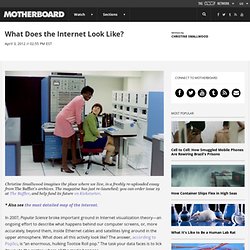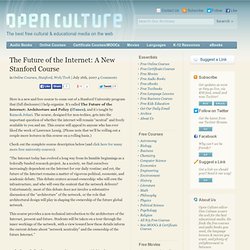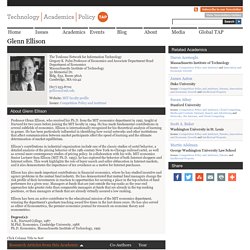

What Does the Internet Look Like? Christine Smallwood imagines the place where we live, in a freshly re-uploaded essay from The Baffler’s archives.

The magazine has just re-launched; you can order issue 19 at The Baffler, and help fund its future on Kickstarter. * Also see the most detailed map of the Internet. In 2007, Popular Science broke important ground in Internet visualization theory—an ongoing effort to describe what happens behind our computer screens, or, more accurately, beyond them, inside Ethernet cables and satellites lying around in the upper atmosphere. What does all this activity look like? The answer, according to PopSci, is “an enormous, hulking Tootsie Roll pop.” The history of the Internet is a history of metaphors about the Internet, all stumbling around this dilemma; How do we talk to each other about an invisible god? We can rule certain images out right at the start. You might be willing to call it a day with the image of a Tootsie Pop, but Popular Science isn’t stopping there. Two hypotheses: 1.
The 140 Best Twitter Feeds of 2012. Why Your Office Needs a MakerBot Printer - Things to Make With a 3D Printer. THE NEXT TRILLION DOLLAR INDUSTRY: 3D Printing. How Much Is Twitter Worth? The World Technology Network. What Eduardo Saverin Did Next (And Why Jumio and Qwiki Matter)
'ACTA is More Dangerous Than SOPA' SOPA and PIPA are stalled (or dead) in the halls of the U.S.

Congress. Yet, there may be a bigger, perhaps more dangerous threat to Internet freedoms on the way, called the Anti-Counterfeiting Trade Agreement, or ACTA. At least that's how U.S. Rep. Darrell Issa, R. - Calif., sees it, telling an audience, "As a member of Congress, it's more dangerous than SOPA. The stunning declaration came during what was actually an upbeat panel discussion at the World Economic Forum in Davos, Switzerland. Congress's inability to change ACTA, Issa added, is "what makes ACTA very dangerous. Unlike SOPA, (Issa called it "radioactive") and PIPA, which are bills in Congress, ACTA is a more far-reaching, global treaty that seeks to normalize copyright protection and intellectual property standards across participating nations.
ACTA already has significant support. Protesting SOPA ACTA on the Way "This process has not been kept from the public. What do you think? Lisa Harouni: A primer on 3D printing. Internet economics. Business & Small Business. Social Media News and Web Tips – Mashable – The Social Media Guide. Haydn Shaughnessy - Re:thinking Innovation. uShip - The Online Shipping Marketplace - Ship Freight, Furniture, Cars or Moves. Qwiki. Custom Search.
Techonomy. The Future of the Internet: A New Stanford Course. Here is a new and free course to come out of a Stanford University program that (full disclosure) I help organize.

It’s called The Future of the Internet: Architecture and Policy (iTunes), and it’s taught by Ramesh Johari. The course, designed for non-techies, gets into the important question of whether the internet will remain “neutral” and freely available to you and me. This course will appeal to anyone who has ever liked the work of Lawrence Lessig. (Please note that we’ll be rolling out a couple more lectures in this course on a rolling basis.) Check out the complete course description below (and click here for many more free university courses): “The Internet today has evolved a long way from its humble beginnings as a federally funded research project. This course provides a non-technical introduction to the architecture of the Internet, present and future. Glenn Ellison. Professor Glenn Ellison, who received his Ph.D. from the MIT economics department in 1992, taught at Harvard for two years before joining the MIT faculty in 1994.

He has made fundamental contributions in several subfields of economics. Ellison is internationally recognized for his theoretical analysis of learning in games. He has been particularly influential in identifying how social networks and other institutions that affect communication between market participants affect the speed of learning and the ultimate determination of market equilibrium. Ellison's contributions in industrial organization include one of the classic studies of cartel behavior, a detailed analysis of the pricing behavior of the 19th-century New York-to-Chicago railroad cartel, as well as several more contemporary studies of pricing policy.
In collaboration with his wife, MIT economics Senior Lecturer Sara Ellison (MIT Ph.D. 1993), he has explored the behavior of both Internet shoppers and Internet sellers. Internet economics. 994 (application/pdf Object) Internet Economics. 902 (application/pdf Object) What Eduardo Saverin Did Next (And Why Jumio and Qwiki Matter)
How to Be a Social Media Power Influencer (And Why!)